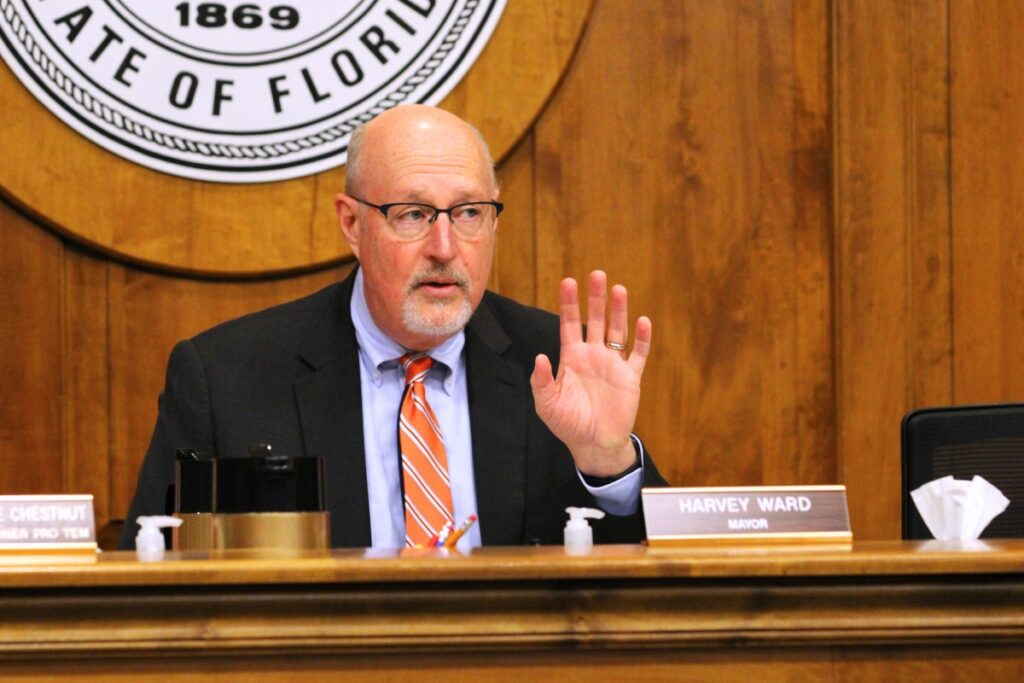
Both Gainesville and UF officials said Thursday that they are at the negotiating table to work through a contract for Regional Transit Service (RTS) bus operations.
UF sent a letter to Gainesville Mayor Harvey Ward Thursday morning in response to a press conference held by the city on Tuesday. The letter, signed by Dave Kratzer, UF’s senior vice president for construction, facilities and auxiliary, said press conferences and threats of route closures are unhelpful.
“We would welcome you back to the table and hope that you will direct your team to provide this crucial data that we have not yet received,” Kratzer said.
Gainesville held a special meeting at 3 p.m. Thursday with only the RTS contract to discuss. Ward said the city had handed over all requested data and would continue to share information, noting that all city documents are public records under Sunshine Law.
“We never left the table,” Ward said in an interview. “We can’t work with what you’ve given us, but we’ll give you whatever information you want. And by the way, we’re going to involve the public in discussions like this.”
Ward said the city felt like negotiations with UF had stalled following the university’s proposed 50% reduction in its payments for bus services. He said the discussion needed to go before the public for input, especially since students would soon be leaving for the summer and lack a voice.
The current three-year contract between UF and Gainesville ends on June 30. UF proposed switching to a monthly payment of $560,000—$6.8 million annually. This plan represents a 50% reduction in UF’s payments.
At Thursday’s meeting, UF students packed the City Hall chambers, forming the bulk of the 29 public speakers. Speakers shared their experiences with RTS and the system’s essential impact on their lives. All the speakers said they disagreed with the university’s proposed plan that city officials say would result in severe cuts to bus routes.
James Ingle, a city resident, also said that besides the reduction in funds, switching to a month-by-month contract would also damage RTS’s ability to plan for the future and make route improvements.
Ingle noted that if UF makes the payment reductions and ends up reversing course, the current bus service wouldn’t be able to return quickly. CDL drivers are in high demand and would quickly find other employment. Many agencies, including Alachua County Public Schools, have had trouble filling bus driver positions in the past few years.
In UF’s letter, Kratzer said the university has a responsibility to carefully steward students’ fees. The majority of what UF pays for RTS service comes from the students’ transportation fee—set at a rate of $9.44 per credit hour.
UF currently pays around $14 million, or 49.2%, of the RTS budget. Kratzer asked for data that would explain why the average cost for a UF student’s bus ride equals $2.86 while the fare price for Gainesville residents is $1.50.
The fare price is only for Gainesville residents between 18 and 64 years old. Anyone above or below that age range can ride for free.
“The data we have right now does not align with the city’s price—we need to understand why, and we ask that you share your data,” Kratzer said.
Ward addressed the issue at the start of Thursday’s meeting. He said the whole transit system is subsidized—just like the majority of transit systems in America. He said each external partner who pays for services (Alachua County, UF and Santa Fe College) helps subsidize RTS with the city.
Ward said any discussion about why the fare is a certain price for some people, free for others and who’s paying for what is a red herring. He said the external partners need to look at the health of the whole system.
Still, city staff and commissioners said UF is getting a good deal for its money. They noted that UF pays for around half the system and UF riders represent around 68% of the users.
Gainesville staff also said the city doesn’t charge capital costs to external parties. City staff put UF’s discount from not including capital costs at 39.4%.
But UF’s volume of riders allows the city to access more funding from the state and federal governments—money not included in UF’s contribution to RTS.
UF used that same number of university riders multiplied by the $1.50 that Gainesville charges residents to arrive at its proposed $6.8 million per year.
“I just want to make sure the system is healthy, and we’re not going to make this about cost per fare because it’s not what it’s about,” Ward said.
With a 50% cut in UF payments, also equal to a 25% reduction in overall budget, city officials said RTS would need to completely eliminate 11 of its 39 routes. Those routes would include all five dedicated UF campus routes.
RTS would also need to remove 36 buses from services and eliminate around 52 positions. Routes not eliminated would see a reduction in frequencies.
Students said the university needs RTS. Without service to campus, more students would drive and need parking. But students said parking is already scarce.
Plus, congestion would increase near campus. City staff estimated that the reduction in bus routes would result in 8,500 to 9,000 additional vehicle trips per day.
The Regional Transit System Advisory Board has scheduled an emergency meeting for Monday, and a UF student body senator told the City Commission that a bill addressing the issue would be discussed at the senate’s Tuesday night meeting.


Anyone relying on Gainesville to spend your money wisely ignores the last ten plus years of city government. Many students have moved into the walk to campus new housing on 13th and University.
This helps solve the car congestion and also reduces the need for bus service to get students to class.
Gainesville wants U of F to pay for the rest of the system. Just based on demonstrated actions I understand why U of F doesn’t want to find anything more than absolutely necessary to Gville. U of F shouldn’t pay for what is Gville issue. Too bad the city is so poor on operating capability.
The Gainesville City Commission got caught gouging UF and UF students by charging them nearly double the normal rate ($2.86 per ride instead of $1.50).
When you consider that student routes are the only routes where the buses are actually full and therefore the most efficient, the City’s unethical behavior becomes even more apparent.
The City *does* need to cut routes–the non-student routes. UF should just get out of the transport negotiations and let UF students buy their own bus passes. Let’s see how student voters react to getting charged double the normal fare.
UF attempted to make significant changes to student activity fee uses without informing the students. It is obvious from the data that many students use RTS. Scooters and bikes would not replace RTS. While many students live near campus, many do not. I am proud that our city responded by informing the public, including the students, before they leave town and come back to reduced transportation service. Our city and UF benefit from the 50 year RTS partnership. Partnership requires that both partners speak openly and honestly. I’m glad both parties are at the table for further discussion.
Non partisan my butt. You lead a Socialist organization and only vote for liberals.
It appears that UF’s David Kratzer wandered into the financial fog that regularly baffles seekers of financial information such as Florida’s Auditor General, GRU customers, accountants, competitive bidders for city contracts, ratepayers, residents and a former Gainesville Mayor. But Kratzer got special treatment, a defensive press conference called by the current Mayor who generates fog on local TV to help the public to know that city hall financing is good for them and Kratzer even got some ink from a candidate for the city commission who appears to stand up for poor folks without ever questioning the special city charges and costs collected from the poorest folks hereabouts.
Weather report : Gainesville Florida City Hall, very foggy between and during press conferences.
Yes, U of F is the adult in this They are negotiating with entitled children.